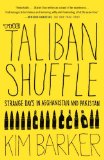Summary | Excerpt | Reviews | Beyond the Book | Readalikes | Genres & Themes | Author Bio

Strange Days in Afghanistan and Pakistan
by Kim Barker
The family invited us to a homecoming party the next day. But I had made a decision. I would listen to Farouq and go back to Kabul through the land of Pacha Khan. No way was I driving eighteen hours on roads that were more like torture devices. As Nasir pulled out of Khost, I decided to feign sickness.
"I'm going to lie down," I told Farouq.
"It's really not necessary," he said.
I lay down in the backseat for what seemed like hours. "Are we there yet?"
Farouq said we were just entering Pacha Khan's stronghold. "There's his truck with the antiaircraft gun."
"What are the men doing?"
"They're waving at us. Why don't you sit up?"
I peeked out the window. The small red pickup truck's windshield was papered in giant mustachioed Pacha Khan stickers and had a large gun somehow strapped to the roof. They waved. I sat up and waved back. We made it to Kabul without further incident. Farouq clearly knew how to handle Afghanistan better than I did.
But the newspaper had no room for my story about Pacha Khan, which was deemed inconsequential compared to Iraq. Almost everything was. So Farouq and I didn't so much work as hang out in the house shared by the Chicago Tribune and two other newspapers. Bored, uninspired, dwarfed by the unstoppable search for weapons of mass destruction nearby, Farouq and I played badminton in the backyard, below a trellis of barren grape vines. We had no net, so we just fired the birdie back and forth at each other.
We talked about our lives. The Tribune's regional correspondent, now off covering Iraq, had hired Farouq the year before. His was a typical Afghan story of surviving a series of regimes by any way possible, usually by putting one relative in the ruling regime and one in the opposition. After the Soviets invaded Afghanistan in 1979, Farouq's oldest brother became a pilot under the Communist-backed government. The large extended family shared a house in Kabul, but other villagers from their home province had joined the so-called "mujahedin," or holy fighters, who fought the government with the help of the Americans, Pakistanis, and Saudis. The brother, the pride of the family, died, not in the fighting but in a plane crash along with his wife and children. Farouq was the youngest son in the family, and for days his family hid his brother's death from him. He found out by accident. Afghans have an almost pathological need to avoid being the bearer of bad tidings.
Eventually, the seven main mujahedin groups and their splinters, militias run by powerful warlords like Pacha Khan, pushed out the Soviets in 1989. Peace did not follow. After years of squabbling and a brutal civil war among the militias, the Taliban and its harsh version of Islamic rule arrived in Kabul in 1996. Farouq and his family were all ethnic Pashtuns, like the Taliban, even if in their hearts they were nothing like the Taliban. But they had no choice; like most other Afghans, they kept their heads down and followed the rules. Farouq's female relatives wore blue burqas that turned them into ghosts whenever they left the house. Farouq grew out his beard, although he occasionally got into trouble because his beard just wouldn't grow to the proper length to signify that he was a good Muslim—considered a fistful of beard.
As the Taliban regime spread its reach, Farouq prepared for his future. He became a doctor. He learned anatomy by digging up skeletons in graveyards—the medical students had no other choice. They practiced surgery on the Taliban, repairing wounds earned fighting the militia leftovers now outside the capital, which had coalesced into a group called the Northern Alliance, dominated by ethnic Tajiks from the Panjshir Valley, just north of Kabul.
Excerpted from The Taliban Shuffle by Kim Barker. Copyright © 2011 by Kim Barker. Excerpted by permission of Doubleday, a division of Random House, Inc. All rights reserved. No part of this excerpt may be reproduced or reprinted without permission in writing from the publisher.
Your guide toexceptional books
BookBrowse seeks out and recommends the best in contemporary fiction and nonfiction—books that not only engage and entertain but also deepen our understanding of ourselves and the world around us.